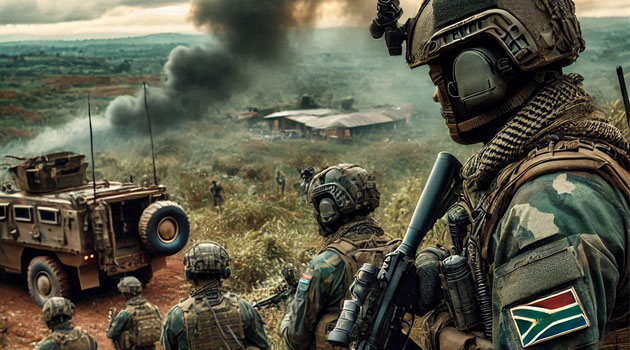
SADC Defence Chiefs, agree on a de-escalation with M23 to allow withdrawal » Capital News
NAIROBI,Kenya, Mar 29 — Chiefs of Defence Forces from the Southern African Development Community (SADC) and the leadership of the M23 have agreed to de-escalate tensions so as to facilitate a peaceful resolution in the Democratic Republic of Congo (DRC).
In a meeting held in Goma on March 28, parties commited to a ceasefire and the unconditional withdrawal of the SADC Mission in the Democratic Republic of Congo (SAMIDRC) troops.
During the engagement, the parties agreed to facilitate the immediate withdrawal of SAMIDRC troops along with their weapons and equipment while leaving behind all FARDC military assets.
“AFC/M23 to coordinate SAMIDRC freedom of movement in preparation for withdrawal in accordance with the principles agreed upon,” read the joint statement in part.
They further resolved to ensure the M23 coordinates the safe movement of SAMIDRC forces as per the agreed-upon principles.
The M23 and SADC also agreed to conduct a joint technical assessment of Goma International Airport to evaluate its readiness for reopening.
Further, the parties agreed to hold a follow-up meeting at a mutually agreed venue and date to monitor progress on the commitments.
The meeting was attended by top military officials and representatives, including General Rudzani Maphwanya, Chief of the South African National Defence Force, Lieutenant General Geoffrey Zyeele, Zambia Army Commander and Major General Saiford Kalisha, Representative of Malawi’s Chief of Defence Force.
Others in attendance were, Major General Ibrahim Michael Mhona, Representative of Tanzania’s Chief of Defence Forces, Professor Kula I. Theletsane, Director of the SADC Organ on Politics, Defence, and Security Affairs, Major General Sultani Makenga, Military Coordinator of AFC/M23 and Chief of Defence Forces of the ARC.
Brigadier General Bernard Byamungu, Deputy Chief of Defence Forces of the ARC and Bahati Musanga Erasto, Governor of North Kivu Province were also present.
The meeting comes two weeks after SADC officially terminated the mandate of the SAMIDRC and directed a phased withdrawal of its troops from the conflict-ridden eastern DRC.
The decision was announced during an Extraordinary Summit of Heads of State and Government chaired by Zimbabwean President Emmerson Mnangagwa in his capacity as the regional bloc’s Chairperson.
The high-level meeting, held virtually, brought together Heads of State, Government representatives, and foreign affairs ministers from 14 SADC member states to deliberate on the worsening security situation in eastern DRC.
While commending the SAMIDRC troops for their bravery, resilience, and dedication, the summit emphasized the need for urgent humanitarian interventions and called on the United Nations, African Union, and other international partners to step up assistance to affected communities.
“Summit called for the protection and free movement of civilians seeking safety and for all parties to uphold international humanitarian principles, stop attacks on civilians’ infrastructure, and guarantee unhindered humanitarian access,” read the Summit’s communique in part on Mar 13.
The summit expressed deep concern over the escalating violence in the eastern DRC, particularly the recent capture of Goma and Bukavu by armed groups, as well as the blockade of key supply routes that has hindered the delivery of humanitarian aid.
Despite acknowledging the dedication and sacrifice of SAMIDRC troops, the summit recognized the urgent need for a new approach to resolving the crisis.
SADC reaffirmed its commitment to supporting long-term peace efforts in the DRC.
The summit reiterated the importance of a political and diplomatic resolution, engaging all relevant stakeholders—both state and non-state actors—to restore stability.
SADC also reaffirmed its support for merging the Luanda and Nairobi peace processes, a decision made jointly with the East African Community (EAC).
The bloc welcomed UN Security Council Resolution 2773, which outlines a framework for a sustainable peace process in coordination with regional organizations like the Economic Community of Central African States (ECCAS) and the International Conference on the Great Lakes Region (ICGLR).